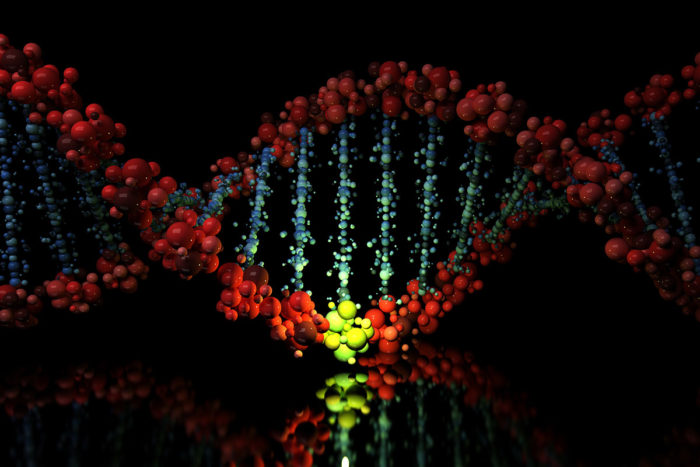How cells detect, mend DNA damage may improve chemotherapy
Targeting pathway could increase potency of some current drugs
 Getty Images
Getty ImagesHuman cells have a way of detecting and mending DNA damage caused by some common chemotherapy drugs, according to a new study from Washington University School of Medicine in St. Louis. The findings could have important implications for treating cancer.
The busy world inside a cell is directed by its DNA blueprint. When the blueprints are altered, cells can sicken, die or become cancerous. To keep DNA in working order, cells have ways to detect and mend damaged DNA.
Now, researchers at Washington University School of Medicine in St. Louis report that they have found a previously unknown way that cells sense a kind of damage induced by certain chemotherapy drugs. The findings, published Nov. 8 in the journal Nature, could have important implications for treating cancer.
Some of the oldest chemotherapy drugs are known as alkylating agents because they kill cancer cells by adding groups of carbon and hydrogen atoms to – or alkylating – DNA. The extent of the alkylation damage overwhelms the cells’ ability to heal themselves via their DNA repair pathways. And some tumors are abnormally dependent on proteins involved in DNA repair, such that knocking out those proteins kills the tumor cells.
“We found that human cells can sense alkylation damage and mobilize a repair complex specifically suited to repair this kind of injury,” said senior author Nima Mosammaparast, MD, PhD, an assistant professor of pathology and immunology, and co-leader of the DNA Metabolism and Repair Working Group at Siteman Cancer Center at Barnes-Jewish Hospital and Washington University School of Medicine. “Knocking out this complex may be a way to increase the potency of certain chemotherapy drugs, or to specifically target tumor cells that have become dependent on the repair complex.”
Alkylation can happen naturally, which is why cells have this repair system in the first place. Also, certain chemotherapy drugs force it to happen. Busulfan, used to treat leukemia, and temozolomide, prescribed for brain tumors, alkylate many spots along DNA. It is difficult for the genetic blueprint to be copied accurately where DNA has been alkylated, so such alkylation damage kills the cells.
Studying cells treated with alkylating chemotherapy drugs or with drugs that lead to other kinds of DNA damage, the researchers determined how cells try to mend DNA damage caused specifically by alkylating agents. They identified a group of proteins that clustered near the spots on the DNA that had been alkylated. Cells that lacked a key member of this protein complex were more likely to die if they were treated with alkylating drugs than cells that had the protein, indicating the importance of the protein complex in repairing DNA. Lacking the key protein made no difference when the DNA was damaged in other ways.
These findings suggest that sensing alkylation damage is a major primary defense against chemotherapy drugs such as busulfan and other alkylating agents. Interfering with this repair complex could amplify the killing power of such drugs and potentially even avert or undermine drug resistance. After a successful course of chemotherapy, tumors sometimes recur tougher than before, having become resistant to the drugs from the first round of treatment.
“There’s some evidence now that overexpressing components of this signaling pathway may be how some tumors become resistant to chemotherapy,” Mosammaparast said. “Blocking this pathway could be a way to make resistant tumors sensitive again.”
Recurrent tumors are not the only ones that may have high levels of DNA repair proteins. Some tumors that have never encountered alkylating chemotherapy drugs have high levels of key alkylation-repair proteins. And when they do, it portends poorly for the patients.
“In some kinds of pancreatic, prostate and lung cancer, overexpressing components of this pathway indicates a significantly worse prognosis,” Mosammaparast said.
There is a possible silver lining, though. Tumors that have high levels of key alkylation repair proteins are often dependent on them, meaning that if those proteins were somehow inhibited, the cells would die. Normal cells are not dependent on this alkylation repair pathway to the same degree. Other repair systems can handle the level of alkylating DNA damage typically encountered by a healthy cell.
“That could be an opening for a chemotherapy drug,” Mosammaparast said. “We may be able to design a drug that is toxic to tumors but not to normal cells by targeting this alkylation repair pathway.”
The drug olaparib, approved in 2014 to treat hereditary ovarian cancer, exploits a similar vulnerability. It targets tumors that are unusually dependent on a repair pathway that stitches DNA back together after it has been cut into pieces. Olaparib blocks that pathway, and without it, the cancerous cells die.






